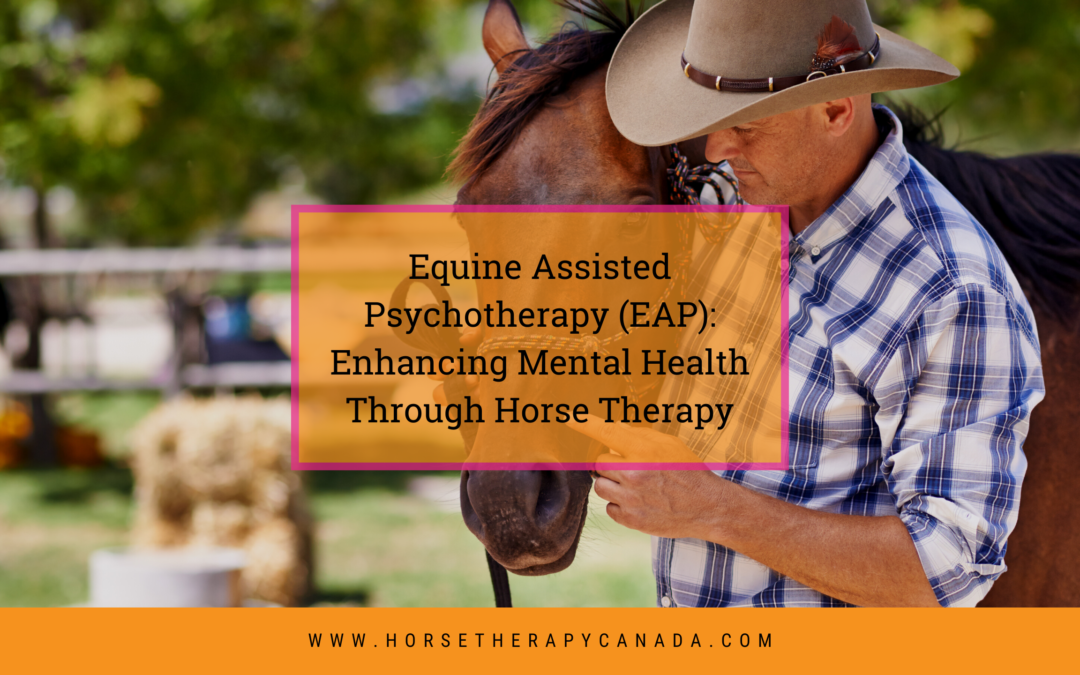Equine Assisted Psychotherapy (EAT / EAP) stands at the crossroads of traditional therapy and the innate bond between humans and horses. Utilizing the power of equine interactions, EAP offers a holistic and experiential approach to healing and personal growth for individuals facing various mental health concerns.

Understanding the Essence of
Equine Assisted Psychotherapy
EAT/EAP involves guided interactions between individuals, a certified mental health professional, and horses. The therapy takes place in a controlled environment where the presence and dynamics of horses become a catalyst for therapeutic breakthroughs. Horses have an exceptional ability to reflect human emotions and intentions, making them valuable co-therapists in the healing process.
This is a brief outline of Horse Therapy, who it can help, how it helps, and which professional you should look for.
Incorporating Psychotherapeutic Modalities

There are many psychotherapy modalities which incorporate well into the Equine-assisted therapy modality. Here are some of the top modalities which are widely used by Equine Assisted Therapists.
Cognitive-Behavioral Therapy (CBT): EAP sessions may incorporate CBT techniques to identify and reframe negative thought patterns, promoting healthier cognitive responses.
Experiential Therapy: EAP is inherently experiential, allowing individuals to process emotions, trauma, and personal challenges through direct interactions with horses.
Mindfulness-Based Approaches: Practicing mindfulness and being present in the moment are essential components of EAP, aiding in stress reduction and emotional regulation.
Addressing Mental Health Concerns Through EAP
Equine Assisted Psychotherapy has demonstrated efficacy in addressing various mental health challenges:
1. Anxiety Disorders
EAP can help individuals manage anxiety by promoting relaxation, building confidence, and enhancing coping strategies through interactions with horses.
2. Depression
The emotional connection formed with horses during EAP can provide vital emotional support, improve mood, and mitigate symptoms of depression.
3. Post-Traumatic Stress Disorder (PTSD)
EAP aids in trauma processing, helping individuals develop trust, reduce hypervigilance, and manage symptoms associated with PTSD.
4. Attention-Deficit/Hyperactivity Disorder (ADHD)
Interacting with horses can improve focus, attention, and impulse control, making EAP beneficial for those with ADHD.
Qualifications of Equine Assisted Therapists
Selecting a certified equine-assisted therapist is crucial for a safe and effective horse therapy experience. Professionals at the Horse Therapy Centre of Canada hold designations in mental health and undergo specialized training and certification in equine-assisted methodologies, ensuring their competency in facilitating therapeutic sessions. Certification programs encompass a comprehensive understanding of equine behaviour, mental health principles, and ethical practices in euine assisted therapies.
Finding an EAP Center and Certified Therapists
To embark on your equine assisted therapy journey, locating a certified Equine Assisted Therapy therapist and qualified center near you is vital.
The Horse Therapy Centre of Canada may be able to help you locate a centre in your area (email: office@horsetherapycanada.com). Additionally, you can contact local mental health organizations or inquire with your existing mental health professional for recommendations.
Important Note About Equine Assisted Learning
It’s important to recognize the distinct roles and benefits of both Equine Assisted Therapy (EAT) and Equine Assisted Learning (EAL), acknowledging that they serve different purposes and are not interchangeable. Equine Assisted Therapy, which focuses on addressing mental health issues and providing clinical intervention, holds a critical position in the field of therapy. For individuals dealing with emotional and psychological challenges, the expertise and guidance of certified Equine Assisted Therapists offer tailored treatment plans and support that can be profoundly impactful in their healing journey.
On the other hand, Equine Assisted Learning, while valuable for personal development and skill enhancement, is not a substitute for therapy when individuals are in need of clinical mental health support. EAL excels in educational contexts, fostering leadership, teamwork, and other life skills. Recognizing these differences and understanding the specific benefits each approach offers ensures that individuals can make informed choices according to their unique needs and goals.
Get Certified as an Equine Assisted Therapist
Aspiring Equine Assisted Therapists looking to attain certification with the Horse Therapy Centre of Canada can embark on an enriching journey through our extensive and comprehensive 4-day certification program. This program is meticulously designed to impart both theoretical knowledge and practical skills essential for proficiently practicing Equine Assisted Therapy. Participants will engage in immersive learning experiences, guided by seasoned professionals in the field, covering a spectrum of topics including equine behavior, client safety protocols, effective therapy techniques, ethical considerations, and business implementation. Through a combination of hands-on sessions and in-depth discussions, attendees will gain a thorough understanding of the therapeutic potential that interactions with horses can offer, ensuring they are well-prepared to make a positive impact in the lives of their future clients.
For more information visit Equine Assisted Therapist Certification page or reach out to our knowledgeable staff today.
Get Certified as an Equine Assisted Learning Facilitator
Aspiring Equine Assisted Learning Facilitators can achieve certification through the Horse Therapy Centre of Canada’s thorough and immersive 4-day certification program. This extensive course provides a comprehensive understanding of both the theoretical and practical aspects of Equine Assisted Learning. Developed and taught by seasoned therapists actively practicing in the field, the program covers essential components of effective EAL facilitation, ensuring participants are equipped to teach and facilitate crucial subjects in this domain. With a focus on hands-on training and in-depth knowledge transfer, this certification program prepares future facilitators to excel in providing impactful Equine Assisted Learning experiences.
For more information visit Equine Assisted Learning Facilitator Certification page or reach out to our knowledgeable staff today.

